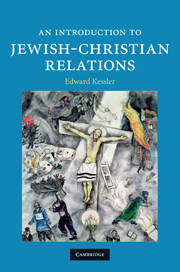Book contents
- Frontmatter
- Contents
- List of illustrations
- Timeline
- Acknowledgements
- List of abbreviations
- 1 Introduction
- 2 The New Testament
- 3 The writings of the church fathers
- 4 The writings of the rabbis
- 5 Biblical interpretation: Another side to the story
- 6 Medieval relations
- 7 Antisemitism and the Holocaust
- 8 Zionism and the state of Israel
- 9 Covenant, mission and dialogue
- 10 Jewish–Christian relations and the wider interfaith encounter
- Further reading
- Glossary
- Index
7 - Antisemitism and the Holocaust
Published online by Cambridge University Press: 05 June 2012
- Frontmatter
- Contents
- List of illustrations
- Timeline
- Acknowledgements
- List of abbreviations
- 1 Introduction
- 2 The New Testament
- 3 The writings of the church fathers
- 4 The writings of the rabbis
- 5 Biblical interpretation: Another side to the story
- 6 Medieval relations
- 7 Antisemitism and the Holocaust
- 8 Zionism and the state of Israel
- 9 Covenant, mission and dialogue
- 10 Jewish–Christian relations and the wider interfaith encounter
- Further reading
- Glossary
- Index
Summary
The eighteenth-century European Age of Enlightenment, also called the Age of Reason, marked the beginning of modernity. It challenged the intellectual assumptions of the traditional religious and political role of the Church and religious authority in general. It witnessed not only the emancipation of Jews and the granting of equal rights, but also the denigration of Jews and Judaism, rooted in a new form of political and social thinking, called antisemitism.
Reaction to the Enlightenment was mixed as both Jews and Christians were struggling to come to terms with it, and in both camps there were radicals and conservatives. Some Jews, like Moses Mendelssohn, the Reformers and the Orthodox leader S. R. Hirsch, welcomed its political and intellectual achievements; others, including the Gaon of Vilna (1720–97) feared the potential of the new ideas to undermine Jewish religious tradition. Engaging in precisely the same battle, conservative Christians such as Pope Pius IX (1846–78) denounced the Enlightenment, condemning freedom of religion and applying the phrase ‘synagogue of Satan’ to describe the enemies of the Church. Pius IX's attitude towards Jews is demonstrated by the Mortara Affair, the forced removal in 1858 of six-year-old Edgardo Mortara (1851–1940) from the home of his Jewish parents because he had allegedly been baptised by a Christian servant as a sick infant. Pius, who took a personal interest in Edgardo, was aware of international outrage but was convinced he had acted in the boy's interests.
- Type
- Chapter
- Information
- An Introduction to Jewish-Christian Relations , pp. 124 - 146Publisher: Cambridge University PressPrint publication year: 2010



